The Chicago winds are blowing and they are wafting the odor of gunpowder and carrying the gasses expelled by firearms. And somber environs such as cemeteries and funeral homes are not immune, thanks to gangbangers banging-out their differences where tears are trickling and “RIP” is etched in stone.
As if Chicago’s persistent gun violence back-monkey isn’t heavy enough, an increase of gang rivals shooting it out at funeral services/processions for gang members murdered by warring factions is becoming the new normal…and an added quandary for law enforcement.
Is nothing sacred anymore? was my thought when a colleague of mine, Sheena Hutchison, gleaned and then shared this story with me. Hallowed grounds are transformed by gang rivals and their firepower rounds.
As Cook County Sheriff Tom Dart told Chicago media: “There has to be a better plan here. This has been something that has been escalating, I’d say over the last 10 to 15 years from where it was not much of a problem, very isolated, to where now it occurs more frequently.” Despite the efforts of his agency and the Chicago Police Department, he admitted the issue has festered for over one decade.
“Chicago police officers and detectives have been engaged in a significant operation to disrupt organized gang activity that has had our communities in a stranglehold for far too long,” Chicago police Superintendent Eddie Johnson told the media in May 2016. In that same month, Chicago PD’s gang suppression unit conducted a large-scale operation to round-up gang members, netting 140 arrests.
I can already see the niche and hazard to guess the costs: security firms contracting with cemetery proprietors and funeral directors for prime compensation since the direct purpose stems from sheer violence involving weaponry and pure pandemonium. And it’s all in the name of colors or territory or indifference to any lives and, in this circumstance, even deaths.
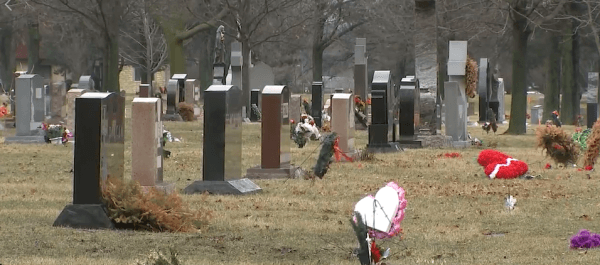
As Fox 32 Chicago news anchor Natalie Bomke reports: “It seems nothing will keep gangs from opening fire on one another in Chicago, not even a funeral. Police are seeing more instances of people hanging out of cars and shooting from vehicles during funeral processions in the city. It’s gotten so bad, Cook County Sheriff Tom Dart is organizing a task force to tackle the issue. At least one cemetery has hired off-duty police officers when a known gang member is going to be buried.”
Cook County Commissioner Richard Boykin (D) explained to media, “These funeral processions have gone through our community where people have been hanging out of cars…there have been shots fired.”
There are zero arguments for anyone suggesting the police should not be wasting time preserving the dead. After all, it is within the purvey of cops to stand-over homicide victims and accident scenes. Now, add cemeteries, funeral home wakes, and casket processional transports.
Chicago police Superintendent Johnson said in a May 2016 interview: “We know we have a lot of violence in Chicago, but we also know there’s a small segment that’s driving this stuff.” Maybe not so small in terms of gang factions feuding throughout city streets.
As a retired policeman, my perspectives often surface as statutes. What laws were broken? How many applicable statutes can we use to lawfully charge the suspect(s)? If plea-bargaining is part of the criminal justice system, why make it easy? If committing 11 crimes is what we have on a crime scene, then 11 charges ought to populate that criminal arrest affidavit.
In terms of gang warfare upon sacred grounds, besides the most-severe criminal charges, my mind immediately conjures “Desecration of burial site” and “vandalism” and disturbance-related laws. The laws of probabilities play a role; specifically, what odds of warring factions exchanging gunfire at a cemetery will invariably deface one or more headstones, mausoleums, plaques, granite memory benches, etc.
Realistically, however, is that the laws come after saving lives —even malicious ones armed with Uzis— and life-saving feats are performed by law enforcement officers. So what are the possible remedies?
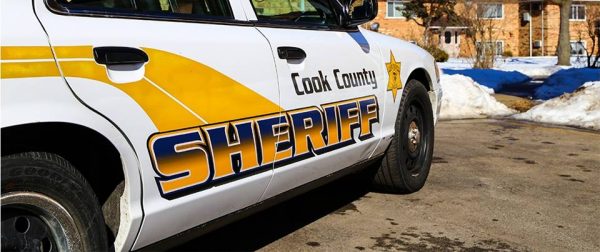
It is neither a secret nor a mystical mirage that Chicago has long-suffered tremendous tolls stemming from gun violence. It is just as evident that the federal government, spearheaded by the Trump administration, has offered to weigh-in with agents and unparalleled resources. An OpsLens piece explored the Trump administration directing the Department of Justice, led by Attorney General Jeff Sessions, to increase its Alcohol, Tobacco and Firearms agents in the Chicago regional field office. With this maneuver, the Chicago Gun Strike Force was birthed in/for the windy city.
In a way, predictive policing strategies in Chicago were already in place, foretelling where the next shootings would take place, by whom, and who is the intended target. But, as Sheriff Dart said earlier, gang violence during funeral processions and/or at cemeteries has been transpiring for roughly 15 years. Somewhere in the predictive measures, anomalies may exist, but police agencies ordinarily have a beat on gang activities in their and surrounding jurisdictions, so it should be relatively easy to figure out that demographic’s next move(s).
If Chicago police gang unit intelligence is on its game, chronicling who is the latest gang casualty is where resource deployments ought to be, both in the funeral procession as well as at the cemetery. Some states condone fully-marked police cruiser escorts, and law enforcement agencies have factions of their motorcycle unit perform motorcade duties.
Per Florida Statute 30.2905, the Hillsborough County Sheriff’s Office (HCSO) “administers a program for the employment of sheriff’s deputies during off-duty hours for public and private services. Off-duty deputies are generally hired to maintain order, facilitate traffic flow, provide security, and escort funeral processions, heavy equipment or wide-load transports.”
Under that same Florida code, state police offer the same services, thus having a larger jurisdictional span (county to county) since some burials occur outside the local area. Funeral parlors do the hiring mostly for traffic control/flow, stopping traffic at intersections. Chicago clearly has a larger dilemma and more significant purpose.
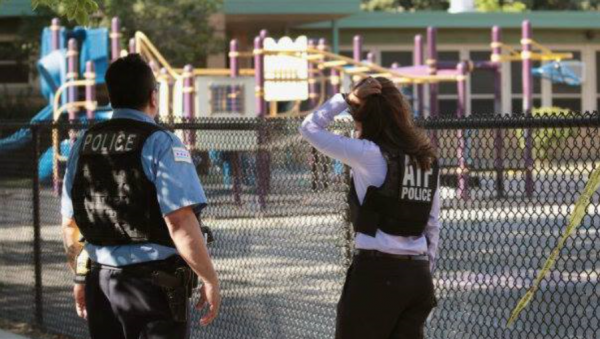
On June 30, 2017, President Trump’s morning Twitter tea contained the following leaf of faith, hope, and outright federal order: “Crime and killings in Chicago have reached such epidemic proportions that I am sending in Federal help. 1714 shootings in Chicago this year!”
As has been and remains the case, Chicago Mayor Rahm Emanuel rebuked any efforts of President Trump. Their head-banging continues today. But this is beyond squabbling over Chicago’s sanctuary city status and Mayor Emanuel’s pushback regarding that contention with the feds.
Nevertheless, Chicago law enforcement authorities are addressing the gang blatancy and craziness by creating its own gang task force to “curb shootings at funerals.” Yes, it has come to that.
Hillside police Chief Joseph Lukaszek says, “It’s getting out of control. It really is. The gangs just think that it’s a safe haven for them and they can do whatever they wanna do.” Given Chicago’s notoriety for chronic gun violence, I don’t believe Chief Lukaszek is infusing hyperbole. Resources…any and all resources would be in Chicago government’s best interest to accept and deploy, before more innocents wind up in a gang crossfire when introspection over a loved one’s passing is disrupted by cold-hearted gangbangers.
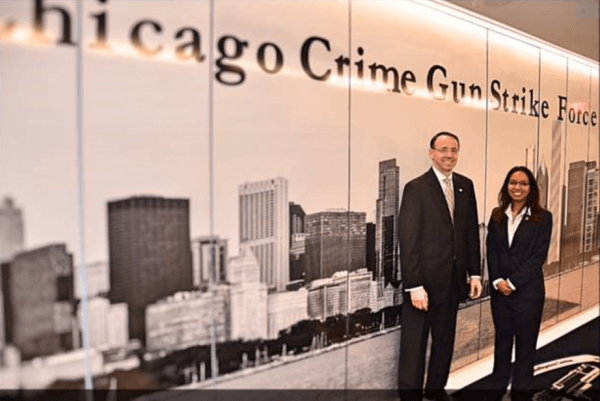
Federal law enforcement officials with the Justice Department continue to offer federal agents and prosecutorial resources as a supplement to Chicago’s city-level law enforcers and district prosecutors. Chicago PD has a gang suppression unit already formed. That particular unit has all the local intelligence pertaining to gang pedigrees and the Who’s who? textbook delineating rival gangs and organizational flowchart.
An effective police agency is one which has more of a preemptive philosophy versus a reactive, hope-for-the-best, let’s-wait-and-see stance. In that light, all resources collectively ought to be deployed to cut the legs out from under these gangbangers whose gun-battles at cemeteries go from sacrilegious to sanctifying.
As Leak and Sons funeral director John McCall described at a press conference with law enforcement figureheads and Chicago area elected officials, “It is traumatic for the [grieving] families and very traumatic for the funeral directors [of Chicago]. The violence that’s going on and all the things that is happening, guns and knives.” That sounds like a city in desperate need of grand intervention.
Sheriff Dart confirmed speculation that one funeral home business has already employed off-duty police officers to work security at wakes and cemetery services. That is well and good, but it still merely waits for bedlam. Gangs do not cater courtesy, often deriving a sense of bravado and gang pride by going-up against a cop. One won’t cut it; heck, a few may not do any good.
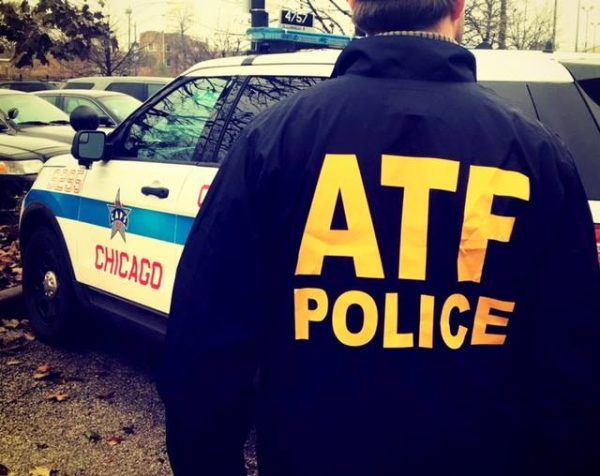
With federal agents and Illinois state police, the Chicago local law enforcement community can harness unbridled allocations to slay the beast once and for all. That cat was out of the bag long ago: gang syndicates engage in criminal enterprises falling under the scope of the federal Racketeer Influenced and Corrupt Organizations (RICO) statute. The RICO ACT was specifically legislated and put in-play to deal with gangster goons who are ultimately apprehended and prosecuted by the federal government. RICO is superiorly effective (federal prisons are NEVER overcrowded) with more-vast federal resources to see the mission to fruition.
Gun dealing, drug trafficking, murder-for-hire, shooting-up cemeteries and funeral processions equates to anarchy in the windy city. While cemetery groundskeepers manicure the greens, multi-level law enforcers need to sweep up the gang scourge.
As Superintendent Johnson telegraphed in 2016, “We are targeting the correct individuals. We just need our judicial partners and our state legislators to hold these people accountable.” If state-level criminal justice authorities can’t get it done, the US Department of Justice will. Their dog’s name is RICO.
















